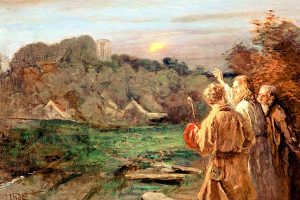Readings (Year B):
Mk 11:1-10
Is 50:4-7
Psalms 22:8-9, 17-18, 19-20, 23-24
Phil 2:6-11
Mk 14:1—15:47
Reflection: The king who comes in peace
I have dreamed of visiting Israel and Palestine since I was a seminary student in the 1990s. But due to various reasons I was unable to visit until Fall of 2023. When I finally went to visit Jerusalem, I was excited to see the Mount of Olives and other sites throughout the holy land.
During my visit, while I was traveling in Nazareth, I fell and broke my kneecap. Even with my broken knee, however, I was determined to walk the Via Dolorosa with crutches and a leg brace. It all felt surreal to me. I couldn’t believe I was walking the same path that Jesus took before his crucifixion on Calvary.
But before the crucifixion of Jesus, Palm Sunday happened. Jesus sent two disciples to secure a donkey for him. Then, Jesus rode into Jerusalem. The excitement and cheers that greeted him were astounding. The crowd took palm branches and went out to meet him, crying out:
“Hosanna! Blessed is he who comes in the name of the Lord! Blessed is the kingdom of our father David that is to come! Hosanna in the highest!”
“Hosanna!” is a cry of victory; it recognizes that Jesus has the power to save. But it is also a cry of needy desperation, the prayer of a sinner who needs a Savior. “Save me, Jesus!” “Hosanna to the Son of David!” In calling Jesus the son of David, they pronounce him the rightful king.
However, the crowds who sang “hosanna” didn’t quite understand what they were saying. Many of them were looking for some kind of political deliverance, an overthrow of the Roman Empire that was so harsh towards them. But this is not the kind of victory that Jesus came to accomplish.
In these times, the image of a king on a horse was one of warfare, whereas a king riding a donkey meant he was coming in peace. When he entered Jerusalem, Jesus rode a donkey which had never been ridden before. He arrived not as a general or a warrior king, to fight the Roman Empire, but as a bringer of peace.
This triumphal entry into Jerusalem marks the beginning of the end.
After Jesus entered Jerusalem, he encountered religious hierarchy, the oppressive Roman government, and even abandonment and betrayal from his own disciples: While Jesus prayed desperately in Gethsemane, his disciples slept after promising to watch one hour with Jesus.
Often, Jesus did the opposite of what the people expected. They expected a warrior king, but Jesus came in peace. Jesus came to help the oppressed and take care of the poor. He came as a prince of peace, not as a herald of war. Rather than bringing more death or suffering, he arrived to give peace, love, mercy, and grace. Ultimately, Jesus came to give his life and deliver all people from sin and death. Thus, Jesus reveals a God who shows mercy and grace to God’s people.
On Palm Sunday, Jesus deserves our welcome as the son of David, our true and rightful king. To him we give our high hosannas, for he is our gentle, meek, and gracious savior.
Palm Sunday which leads into Holy Week challenges us and demands our response: Can we like Jesus share grace and mercy to others, even those whom we have difficulty loving and forgiving?













Add comment